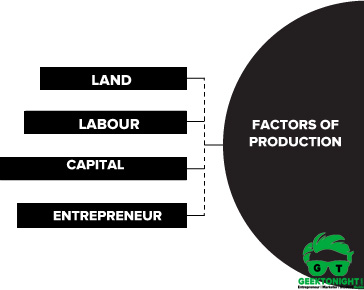Production in Economics
Production in Economics is sometimes defined as the creation of utility or the creation of wants – satisfying goods’ and services. It is said that just as a man cannot destroy matter, he also cannot create matter.
“If consuming means extracting utilities from,” says Fraser, “producing means putting utility into.”
Production, therefore, should be defined, not as a creation of utility, but the creation (or addition) of value. Utilities are created in three forms:
- Form utility
- Time utility
- Place utility.
Production in Economics is a very important economic activity. As we are aware, the survival of any firm in a competitive market depends upon its ability to produce goods and services at a competitive cost.
One of the principal concerns of business managers is the achievement of optimum efficiency in production by minimising the cost of production.

Table of Content [Show]
What is Production?
In economics, Production is a process of transforming tangible and intangible inputs into goods or services.
Raw materials, land, labour and capital are the tangible inputs, whereas ideas, information and knowledge are the intangible inputs. These inputs are also known as factors of production.
Also Read: Production Possibility Curve
Production Definition
Production in Economics can be defined as an organised activity of transforming physical inputs (resources) into outputs (finished products), which will satisfy the products’ needs of the society.James Bates and J.R. Parkinson
Production in Economics is an activity whether physical or mental, which is directed to the satisfaction of other people’s wants through exchange.J.R. Hicks
Concept of Production
Production in Economics can be defined as the process of converting the inputs into outputs. Inputs include land, labour and capital, whereas output includes finished goods and services.
In other words, Production in Economics is an act of creating value that satisfies the wants of the individuals.
Organisations engage in production for earning maximum profit, which is the difference between the cost and revenue. Therefore, their production decisions depend on the cost and revenue. The main aim of production is to produce maximum output with given inputs.
Also Read: What is Consumer Demand?
Importance of Production
Production in Economics is considered very important by organisations.
Importance of Production are as follow:
- Helps in creating value by applying labour on land and capital
- Improves welfare as more commodities mean more utility
- Generates employment and income, which develops the economy.
- Helps in understanding the relation between cost and output
Also Read: Production Function
Factors of Production
Factors of Production in Economics are the inputs that are used for producing the final output with the main aim of earning an economic profit.
Land, labour, capital and entrepreneur are the main factors of production. Eachand every factor is important and plays a distinctive role in the organisation.

Land
Land is the gift of nature and includes the dry surface of the earth and the natural resources on or under the earth’s surface, such as forests, rivers, sunlight, etc.
Land is utilised to produce income called rent. Land is available in fixed quantity; thus, does not have a supply price. This implies that the change in price of land does not affect its supply. The return for land is called rent.
Characteristics which would qualify a given factor to be called land
- Land is a free gift of nature
- Land is a free gift of nature
- Land is permanent and has indestructible powers
- Land is a passive factor
- Land is immobile
- Land has multiple uses
- Land is heterogeneous
Labour
Labour is the physical and mental efforts of human beings that undertake the production process.
It includes unskilled, semi-skilled and highly skilled labour. The supply of labour is affected by the change in its prices. It increases with an increase in wages. The return for labour is called wages and salary.
Characteristics of labour:
- Human Effort
- Labour is perishable
- Labour is an active factor
- Labour is inseparable from the labourer
- Labour power differs from labourer to labourer
- All labour may not be productive
- Labour has poor bargaining power
- Labour is mobile
- There is no rapid adjustment of supply of labour to the demand for it
- Choice between hours of labour and hours of leisure
Capital
Capital is the wealth created by human beings. It is one of the important factor of production of any kind of goods and services, as production cannot take place without the involvement of capital.
Capital is an output of a production process that goes into another production process as an input. Capital as a factor of production is divided into two parts, namely, physical capital and human capital.
Physical capital includes tangible resources, such as buildings, machines, tools and equipment, etc.
Human capital includes knowledge and skills of human resource, which is gained by education, training and experience. Return for capital is termed as interest.
Types of Capital
- Fixed capital
- Circulating capital
- Real capital
- Human capital
- Tangible capital
- Individual capital
- Social Capital
Entrepreneur
Entrepreneurship consists of three major functions, viz., coordination, management and supervision. An entrepreneur is a person who creates an enterprise. The success or failure depends on the efficiency of the entrepreneur.
An enterprise is an organisation that undertakes commercial purposes or business ventures and focuses on providing goods and services. An enterprise is composed of individuals and physical assets with a common goal of generating profits.
Functions of an entrepreneur
- Initiating business enterprise and resource co-ordination
- Risk bearing or uncertainty bearing
- Innovations
Leave a Reply